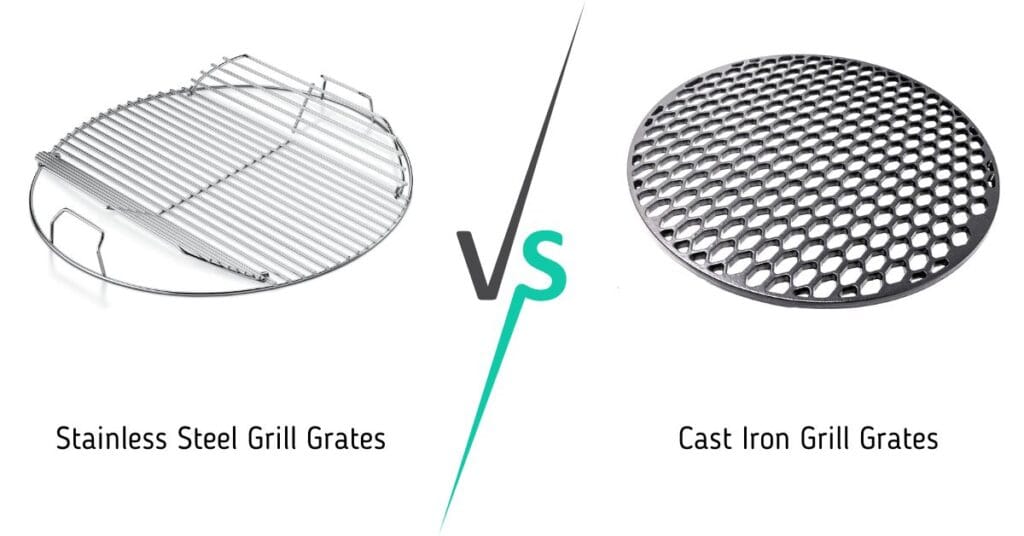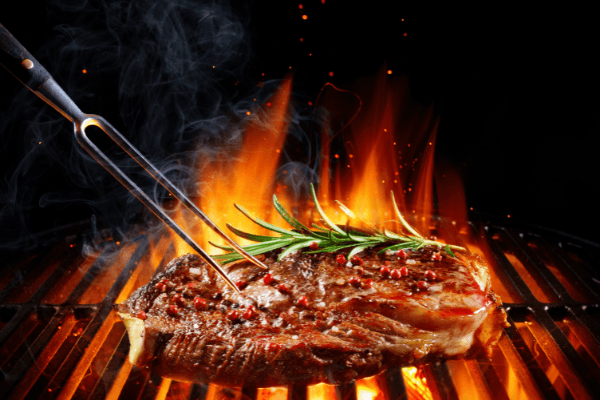When it comes to cooking on the grill, there are a few different options available for you. You can use stainless steel grill grates, cast iron grill grates, or even aluminum grill grates. So what is the best option for you? In this blog post, we will compare stainless steel grill grates vs cast iron grill grates and help you decide which one is right for your needs!

The Basics Of Cast Iron
These grill grates are a popular choice for many grill masters. The rough texture of uncoated cast iron helps to create flavorful grilled food, while the smooth finish of porcelain-coated cast iron is easier to clean. They even offer heat distribution and excellent heat retention, making them ideal for cooking at high temperatures.
In addition, cast iron grill grates are very durable and can last for many years with proper care. To season a cast iron grill grate, simply coat it with oil and heat it until it is smoking hot. This will create a non-stick surface that will help to prevent your food from sticking to the grate. With proper care, a cast iron grill grate will provide years of delicious grilled meals.
The Basics Of Stainless Steel
As any grill master knows, not all grills are created equal. There are a wide variety of different materials that can be used to make a grill, each with its advantages and disadvantages. One of the most popular ingredients for grills is stainless steel. Stainless steel grills are prized for their durability, affordability, and easy maintenance.
However, stainless steel grills can also be susceptible to corrosion over time if not properly cared for! As a result, it’s important to clean and treat your grill regularly to ensure that it stays in good condition. With a little care, your stainless steel grill will provide years of trouble-free cooking.
The Pros And Cons Of Cast Iron Cooking Grates
Here is a closer look at the pros and cons of cast iron cooking grates:
Overall, cast iron is a great option for a cooking grate, but it’s important to weigh the pros and cons before making a purchase.
The Pros And Cons Of Stainless Steel Grill Grates
Check out these 8 best stainless steel grills.
Things To Consider Before You Buy a New Grill
There are several things to take into account when purchasing a new grill grate.
- The first is the type of food that you typically cook. If you tend to grill mostly chicken or other lean meats, then you’ll want to look for a grill grate that won’t stick and is easy to clean.
- Stainless steel is a good option in this case. However, if you frequently grill fatty meats or fish, then you’ll want to choose a grate that can withstand high temperatures without warping.
- In this case, cast iron is the best choice. Another consideration is the size of the grate. If you have a large grill, then you’ll need a correspondingly large grate.
- Finally, you’ll want to think about how often you plan to use the grill. If you only fire it up on special occasions, then you might be able to get by with a less expensive model.
However, if you’re an avid griller, then you’ll want to invest in a higher-quality product that will last for years. By taking all of these factors into account, you can ensure that you choose the perfect grill grate for your needs.
Cleaning Of Stainless Steel Grate
It is important to clean stainless-steel grates to prevent corrosion. Baking soda and aluminum are effective cleaning agents. To clean, make a paste of baking soda and water. Apply the paste to the grate with a soft cloth. Rub in a circular motion. Rinse with clean water and dry with a soft towel. Aluminum foil can also be used to clean stainless-steel grates. Create a ball out of the foil and rub it over the grate in a circular motion. The foil will remove any residue on the grate. Rinse with clean water and dry with a soft towel.
Read a full guide on how to clean stainless steel grill grates by using 3 easy methods!
Cleaning Of Cast Iron Grate
Caring for your cast-iron grates doesn’t have to be difficult. There with a little time and effort, you can keep them looking like new for years to come. Here are a few tips to get you started:
- Use a wire brush to remove any build-up of food or grease from the grate. If the build-up is particularly stubborn, you may need to preheat it to 400 or 500 degrees Fahrenheit first.
- Season the grate with vegetable oil or shorten it after each use.
- Store the grate in a dry place when not in use. Moisture can cause rusting, so it’s important to keep it as dry as possible.
- If the grate does develop rust, scrub it off with a wire brush and reseason it with oil before using it again.
Tips For Preventing Food From Sticking To Your Grates

- Nonstick surfaces are ideal for many cooking tasks, but they’re not well suited for grilling. When exposed to high heat, nonstick coatings can begin to break down, releasing harmful fumes.
- Oil helps to create a barrier between the food and the grill grate. Just be sure to use high-smoke-point oil, such as vegetables or canola oil.
- Flipping too early is one of the most common mistakes people make when grilling. It’s important to give the food time to form a crust before attempting to flip it. Otherwise, it’s likely to stick.
- Preheating your food before grilling will also help to prevent sticking. By starting with a hot surface, you’ll be less likely to lose any of your food to the grill grate.
FAQs
What type of metal is best for a BBQ grill?
There are a few different types of metal that can be used for BBQ grills, but stainless steel and cast iron are two of the most popular options. Each type of grill has its advantages and disadvantages, so it’s important to choose the one that best suits your needs.
Do you spray a grill with Pam?
No, you should not spray a grill with Pam. Pam is a cooking spray that contains vegetable oil and canola oil. These oils have a low smoke point and can begin to break down when exposed to high heat. This can release harmful fumes into the air.
Does vinegar damage stainless steel?
Yes, vinegar can damage stainless steel. Vinegar is an acidic substance that can eat away at the protective layer of stainless steel. This can lead to corrosion and rusting. If you must use vinegar to clean your grill, be sure to rinse it off thoroughly with water afterward.
Read Also: Saber Grills Vs Weber Grills: Which is the best?
Wrapping Up
So, what’s the final call? The answer isn’t as clear-cut as you might think. Both have their pros and cons, and it ultimately depends on your personal preferences and cooking style. If you want a quick clean-up and don’t mind having to season your cast iron grill grates, they may be a good option for you.
But if you prefer a rust-free grate and are willing to spend a bit more time cleaning up after cooking, stainless steel is probably the better choice. Whichever type of grill grate you choose, make sure to keep it clean that’s the best way to ensure delicious results every time!